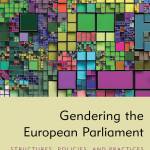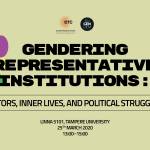CANCELLED
Gendering Representative Institutions:
Actors, Inner Lives, and Political Struggles
25th March 2020 at 13:00-15:00
Tampere University, Linna Building, Room: Linna 5101
Welcome to the research seminar “Gendering representative institutions: actors, inner lives, and political struggles” organised around the research visits of Josefina Erikson and Eva-Maria Euchner by the ERC-funded research project EUGenDem, Gender Studies, Tampere University. The EUGenDem project team is delighted to introduce Dr. Erikson and Dr. Euchner to the research community here in Tampere and to Finland.
The seminar addresses questions of intersectional and gendered representation in parliaments. Josefina Erikson speaks about whether age impacts MPs differently and which negative gendered patterns occur for young women compared to other age/gender groups. For the European Parliament, Eva-Maria Euchner examines the effect of national quotas in supranational European Parliament elections and discusses how the design of quotas influences parliamentary activity.
Presentations:
Dr Josefina Erikson* (Uppsala University, Sweden): The toxic reality for young female MPs: On the intersection between gender and being young in the Swedish Parliament
Women and young people are systematically under-represented in parliaments all over the world. According to the Inter-Parliamentary Union, women under the age of 45 are the most under-represented of all groups. But what exactly does this mean for young women in politics? In this talk I will discuss the intersection between age and gender, and present some findings from our recent study of the Swedish parliament, in which we investigated whether age impacts female and male MPs differently. Using original survey data from the Swedish Parliament (response rate 82%, n = 287) in combination with 40 in-depth interviews with young male and female MPs, we found that young women experience higher demands and anxiety, and are more subject to negative treatment compared to other age/gender groups. Young men, on the other hand, stand out as the least exposed group. Together our results demonstrate that a young age reinforces negative gendered patterns for women in parliament, while age appears irrelevant or even, at times, a beneficial factor for young men.
Dr Eva-Maria Euchner* (Ludwig-Maximilians-University of Munich, Germany): Gender Quotas in the elections to the European Parliament: design, pattern and consequences
In recent years, gender quotas have become a popular electoral rule to boost the diversity of political institutions (Krook, 2009; Krook and Zetterberg, 2014). The countries that have adopted gender quotas are diverse, and include Rwanda, Sweden, Argentina, and Nepal. Consequently, the first generation of scholars has focused on the adoption processes in different countries, while the second generation is now examining the impact of gender quotas in terms of descriptive, substantive or symbolic representation (e.g. Baldez, 2006; Franceschet, Krook and Piscopo, 2012a; Franceschet and Piscopo, 2008; Krook and Messing-Mathie, 2013). Most of these studies explore national settings and hence, ignore gender quotas in supranational institutions, such as the European Parliament (but see Kantola 2010, Fortin-Rittberger and Rittberger 2015). The first part of this talk contributes to this research gap by providing an overview of the design of gender quotas employed in the elections to the European Parliament and illustrate its consequences in terms of the descriptive representation of women in the European Parliament. Based on Krook and Messing-Mathie’s (2013, p. 301) suggestion ‘to “think big” about why quotas might matter for politics more broadly’, the second part of the talk goes one step further and discusses how gender quotas, and particularly their design, impact parliamentary activities. So far, the research on gender quotas and legislative behaviour is largely unconnected (Finke, 2019, p. 66; Zetterberg, 2013, p. 318). Within the group of scholars exploring the impact of gender quotas on (substantive) representation, very few focus on parliamentary activity, and if so, primarily with the question in mind under which conditions gender quotas work (e.g. Murray, 2007, for France, Childs, 2008, for UK and Wang, 2014, for Uganda; Franceschet, 2010 for Chile; but see Finke, 2019; Zetterberg, 2013). The scholarship on legislative behaviour conceptualises gender mainly as social identity that challenges party cohesion (Bäck, Debus and Müller, 2014; Euchner and Preidel, 2017; Russell, 2014), but rarely considers gender quotas as an electoral institution, systematically influencing political activities in legislative institutions (Zetterberg, 2013, p. 316). Accordingly, it is still unclear how gender quotas, and specifically their design influences parliamentary activity (Franceschet, Krook and Piscopo, 2012b, p. 230) and exactly this black box will be enlightened in the second part of the talk.
*For more information about Josefina Erikson and Eva-Maria Euchner, see here.
To secure a cinnamon bun and a coffee, sign up for the seminar by sending an email to: petra.ahrens@tuni.fi by Monday, 16 March 2020.

We also cordially invite you to the book launch of “Gendering the European Parliament: Structures, Policies, and Practices” (co-edited by Petra Ahrens, Tampere University, and Lise Rolandsen Agustín, Aalborg University, Denmark) directly after the seminar. The book launch and the drinks will take place from 15:15 onward in the fifth floor ‘lounge space’, i.e. directly next to the lifts.




